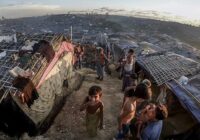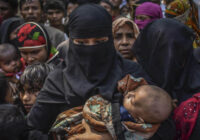The international community must continue to demand access and not accept simple ambiguous statements from the Myanmar government.
A new dangerous dynamic has been unleashed in western Myanmar since the October 2016 attack by a group of Rohingya militants and the subsequent Burmese army crackdown on the general Rohingya population in northern Rakhine State. While the causes and consequences are complex, there is one move that the government of Myanmar can do to address growing international criticisms and mitigate the immediate emergency: grant full and unfettered humanitarian access to the tens of thousands in dire need.
The United Nations Refugee Agency (UNHCR) estimates that some 160,000 civilians in northern Rakhine State who had been dependent on humanitarian aid were cut off as of October 9, 2016. Some 27,000 Rohingya have been displaced internally and at least 65,000 have fled the country for Bangladesh, according to the United Nations (UN). UN officials have warned of ethnic cleansing and other crimes against humanity.
The heavy-handed army response was precipitated by an attack by Rohingya militants on border guard stations in which nine officers were killed and several weapons stolen. The search for the perpetrators and attempts to retrieve the stolen weapons quickly escalated to a blanket response with disproportionately negative consequences for the broader Rohingya Muslim population.
Thousands of Rohingya homes have been burned, almost certainly by the Tatmadaw, as recorded by Human Rights Watch via satellite photographs. Helicopter gunships have been unleashed on Rohingya villages. And there has been a steady stream of reports of rapes, beatings and extra-judicial executions. The government’s response has been a disappointing blocking of access to outside observers and of much needed international humanitarian assistance.
Humanitarian Access to Rakhine State in Myanmar
On December 19, 2016, in response to rising regional criticism, Myanmar’s effective leader Aung San Suu Kyi met with foreign ministers from neighboring countries and vowed to allow “necessary humanitarian access.” But the statement was short on details and mixed with a plea for time and space for Myanmar to address the challenges. The tens of thousands of Rohingya who remain without aid have no such luxury and such ambiguous statements are clearly insufficient.
The granting of full and unfettered humanitarian access would provide the government of Myanmar an opportunity to answer its critics and prove that Suu Kyi and her government are truly different from the previous military-dominated government.
 One need not look back very far for a contrast. In March 2014, the previous government expelled the group Doctors Without Borders from Rakhine State for several months, and even when allowed back it was nowhere near the level of aid it had previously provided. In the first few weeks, it was estimated that some 150 of the most vulnerable people had died due to lack of access to medical care. The number of unnecessary deaths from a lack of medical attention and food since October is unknown as the government continues to restrict outside access to Rakhine State, but so far the response has been in lockstep with the previous government.
One need not look back very far for a contrast. In March 2014, the previous government expelled the group Doctors Without Borders from Rakhine State for several months, and even when allowed back it was nowhere near the level of aid it had previously provided. In the first few weeks, it was estimated that some 150 of the most vulnerable people had died due to lack of access to medical care. The number of unnecessary deaths from a lack of medical attention and food since October is unknown as the government continues to restrict outside access to Rakhine State, but so far the response has been in lockstep with the previous government.
In some ways this is unsurprising, as the military continues to wield tremendous influence, particularly on security matters. But Suu Kyi has failed to invoke even the limited influence she has, choosing instead to back the military’s position. But doubling down on the army’s denial of abuses and restriction of much needed aid will only erode international goodwill and encourage further abuses.
The international community and Myanmar’s neighbors in particular, for its part, must continue to demand access and not accept simple ambiguous statements. New pledges to allow aid into northern Rakhine State in Myanmar are welcome, but must be seen through and sustained. In other words, just how much time and space should be allotted to the government of Myanmar should come in direct proportion to just how “necessary” Myanmar determines humanitarian access and an end to egregious abuses to be.
The views expressed in this article are the author’s own and do not necessarily reflect Fair Observer’s editorial policy.
Photo Credit: Jcarillet
Support Fair Observer
We rely on your support for our independence, diversity and quality.
For more than 10 years, Fair Observer has been free, fair and independent. No billionaire owns us, no advertisers control us. We are a reader-supported nonprofit. Unlike many other publications, we keep our content free for readers regardless of where they live or whether they can afford to pay. We have no paywalls and no ads.
In the post-truth era of fake news, echo chambers and filter bubbles, we publish a plurality of perspectives from around the world. Anyone can publish with us, but everyone goes through a rigorous editorial process. So, you get fact-checked, well-reasoned content instead of noise.
We publish 2,500+ voices from 90+ countries. We also conduct education and training programs
on subjects ranging from digital media and journalism to writing and critical thinking. This
doesn’t come cheap. Servers, editors, trainers and web developers cost
money.
Please consider supporting us on a regular basis as a recurring donor or a
sustaining member.
Will you support FO’s journalism?
We rely on your support for our independence, diversity and quality.






